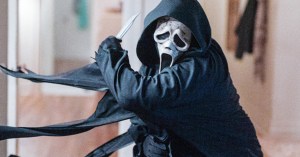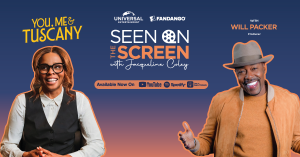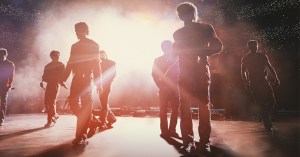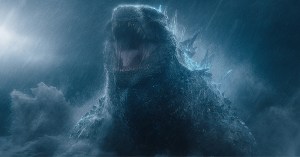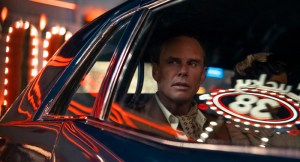An Oral History of The Karate Kid With Ralph Macchio and William Zabka
Ralph Macchio and William Zabka reflect on the first film in their iconic '80s franchise.
Few films have left their mark on the popular culture the way that 1984’s The Karate Kid has. Even kids who didn’t rush to see it in theaters in June of that year, or didn’t grow up wearing down the tape on their VHS copy of the film, can recite the movie’s most famous lines – “Sweep the leg!” – and recall its most indelible images. But more than iconic one-liners and memorable fights, what sticks with us about The Karate Kid are its key relationships, namely those between Daniel LaRusso (Ralph Macchio) and mentor Mr. Miyagi (the late Pat Morita) and Daniel and Johnny Lawrence (William Zabka).
So fierce and so memorable was the rivalry between Daniel and Johnny that more than three decades after the first Karate Kid movie was released, YouTube Originals re-ignited it for the streaming series Cobra Kai, the second season of which has just dropped online. Except now the tables had turned, and one-time-bully Johnny was the sympathetic anti-hero.
As we gear up for another round with Daniel and Johnny – and if their coy responses to our questions indicate, a potential slew of cameos from fans’ favorite characters – we sat down with Macchio and Zabka to go back to the beginning. In this oral history of The Karate Kid, the two men recall the time they met as kids, their pre-Karate Kid experience with martial arts (“I had no technique, I had no idea”), working with Pat Morita, and the impact the movie would have on their teen years and their lives. From audition to their climactic on-screen showdown, this is Macchio and Zabka’s story of the time they became the world’s most famous karate kids.
What follows is a history of The Karate Kid (1984) and reflection upon the film, drawn from a sit-down interview with Macchio and Zabka.
ALSO WATCH: ORAL HISTORY OF COBRA KAI WITH RALPH MACCHIO AND WILLIAM ZABKA
“As a kid, you’re jumping around and fighting imaginary bad guys, you know?”
Ralph Macchio: “When I was about 10 or so, for Christmas I got a certificate for the local jiu-jitsu school of self defense — obviously, mom and dad said, ‘We gotta help this guy out a little bit,’ I don’t know — for me and my brother. So we went, and I took a handful of lessons. I liked it.”
William Zabka: “My relationship with karate before Karate Kid was all in my imagination. As a kid growing up, I would just run around and do fake fights, and I’d be in the backyard with sticks, but I had no technique, I had no idea. I took no classes before Karate Kid. I was a wrestler in high school, so I was limber, and I had a lot of conditioning, so I was prepared to learn the training for karate, and martial arts but I didn’t know any real [moves]. It was all in my mind. As a kid, you’re jumping around and fighting imaginary bad guys, you know?”
“I can’t guarantee you anything right now, but if I were you, I’d take some karate lessons.”
Macchio: “My first conversation about being Daniel LaRusso was with our director John Avildsen, who I auditioned for, and … it’s the first time ever I ever read the words to that character. It’s Avildsen explaining the character, explaining what he’s going through, explaining the story leading up to my audition scene, which was the scene from the film where Daniel wakes up after the skeleton fight at the fence and Miyagi saves the day, and he’s asking all these questions.

(Photo by ©Columbia Pictures/Courtesy Everett Collection)
That’s my earliest memory of the character. I didn’t have the part yet, but I did remember John Avildsen saying to me, ‘I can’t guarantee you anything right now, but if I were you, I’d take some karate lessons.’ Which doesn’t often happen. That was a pretty exciting moment. And then a couple more hoops to jump through, and here I am, I got to be Daniel LaRusso.”
“Watch your mouth, asshole.”
Zabka: “Through my manager, I got a phone call to come in, they want to talk to you. So I went to Columbia Pictures at that time, and drove through the gate and went to a bungalow. I just came directly from the gym, and I was in my tank top, probably wearing a headband or something. I went in and they said, ‘There’s this movie called Karate Kid. We think you’d be great for this part of Johnny. Go home and read it, and come back and audition tomorrow for John Avildsen.’
So I went home and read the script, and Johnny’s this karate master and he’s a motorcycle gang leader. He’s the bad guy. I’m like, ‘Oh, my gosh, I don’t know karate. I don’t know how ride motorcycles.’ But there was one scene in the script that I really connected to, and somehow I just connected to the character. I ran it through in my living room a bunch of times, and then the next day went and met John Avildsen. He was sitting in a chair. He had his camera. He always had his video camera filming everything. And it was a scene cut out of the movie, where I hand Daniel a death certificate at the water fountain. And he said, ‘What’s this for?’ And I go, ‘You gotta get your mommy to sign it so you could be in the tournament with the big boys.’ And he says, ‘I thought it was supposed to be no contact.’ And I say, ‘Accidents happen.’

(Photo by ©Columbia Pictures/Courtesy Everett Collection)
And then I walk away, and he goes, ‘Hey, you think he might be wrong?’ And I go, ‘Who?’ And he goes, ‘Your instructor, your sensei, you think he might be wrong?’ And then my line is, ‘Watch your mouth, asshole.’ So on that line, that’s when I walked over to John Avildsen and grabbed him — which you don’t do — and I said, ‘Watch your mouth, asshole.’ And I pushed him back, and the room was still. And that’s where the scene was supposed to end, but everybody was still watching me, so I improv’d and went to the door. I said, ‘Read it and weep. I’ll see you in the tournament.’ And went out in the waiting room, and came in, took my headband off, which I was wearing, and I said, ‘I’m sorry, I’m sorry. That was Johnny. I’m Billy.’ He goes, ‘So how old are you?’ He got kind of interested, and he goes, ‘You’re a little taller than our karate kid.’ And I’m like, ‘Yeah, well, Bruce Lee was smaller than Kareem Abdul Jabbar.’ He goes, ‘Well, you got a point. All right, thanks, kid.’ And that was that.”
“We were friendly, but we weren’t [best friends].”
Macchio: “[Zabka and I] trained differently. We both trained with Pat Johnson, who did all the fight choreography. He’s the referee in The Karate Kid film. He would train myself and Pat Morita in a classic Okinawan style, and he would train Billy and the Cobra Kai guys in a more aggressive style of martial arts. Most of the scenes we did together we were either yelling at each other or I was getting my ass kicked. So we were friendly, but we weren’t [best friends]. I had the whole Miyagi side of the story, and the romance side of the story. The movie was always in three sections for me. We’ve become closer friends over the years and certainly when Pat passed away we became closer friends just through the loss of him and moving forward, and the fact that this film has stood the test of time. It’s a big part of not only American cinema, but also pop culture. And then here we are back again in tandem. So it’s been quite a journey.”
Zabka: “My memory of working with Ralph was we were best friends instantly. I’m surprised to hear you say that we were separated. We have to talk after this.
I think John Avildsen really created the chemistry by casting all the right people for this. He cast the right Tommy, Bobby, Dutch, and Jimmy. … It was almost like he created this little universe for us. We hung around all the time. We went to lunch every day. We rode motorcycles together, we trained together. We really got into a pack mentality. Ralph and I did our fight scene for the tournament every day we could for three months, so we were working together constantly. I mean, feet and fists were flying, so we had to take care of each other in that way. But the Cobra Kais, they were like my brothers, and they still are in real life.”
“It’s like a strawberry shortcake and a cannoli.”
Macchio: “Ali with an ‘i.’ That character is arguably what starts the rivalry, the feud, if you will. Like all good wars, a beautiful woman, and that’s the end of that. [Elisabeth Shue] was just coming out of the gate at that point. And John Avildsen would see me and Lisa — Lisa Shue was what we called her — and he would say, ‘You two have no place being together. It’s like a strawberry shortcake and a cannoli.’ That’s how he described LaRusso and Ali Mills. It was fun. It was the birth of those young characters, young love, high school, adolescence, all that stuff.”

(Photo by ©Columbia Pictures/Courtesy Everett Collection)
Zabka: “We got along great. She was tough, she was athletic, she was a soccer player. Really physical, and she was just an all-natural girl and beautiful and cool, and we became friends. The only time I got connected in the whole movie with a punch or a kick [was during] the country club scene where Daniel comes in and gets the spaghetti on him, and then I laugh and Lisa punches me in the jaw. Every single time she connected, like, boom. Pat Johnson’s like, ‘No, step back and swing.’ But I think every single time she hit my jaw. In fact, when Daniel falls down in the spaghetti and I’m laughing, I’m half laughing at the fact that she just hit me. Yeah, she was great.”
“What Pat Morita taught me more than anything is not to take things for granted, to revel in the opportunity that you have.”
Macchio: “I mean, with Pat Morita, everything he brought — I was truly witnessing the right actor in the right role, never taking it for granted, feeling a great responsibility, meaning him feeling a great responsibility playing a Japanese-American in that film at that time. And I always bring this information to the table, that The Karate Kid is the first mainstream major motion picture that ever dealt with the World War II Japanese internment camps.
The movie is so often thought of as pop culture, ‘Get him a body bag,’ crane kicks, waxing on, and catching flies with chopsticks, but it also has all these other deeper elements to it, which is why it’s, in my view, a great film. What he taught me more than anything is not to take things for granted, to revel in the opportunity that you have.
There was an ease of working with him in those scenes. There’s something relaxed about it. He would talk to John Avildsen or myself about the headband, which was called the hachimaki. Using that, taking it out of his pocket [to] use it as a napkin, or a handkerchief to wipe [your brow], but then you’d also wear it, and then we’d put it on for training purposes. Daniel always wore it for that.

(Photo by ©Columbia Pictures/Courtesy Everett Collection)
All those moments and experiencing him teaching us [about] that culture, and wanting to pay homage and respect to the Japanese-American culture — Okinawan in this case — taught me that those moments of ease that we had just fed into the chemistry that we had that I didn’t even know we had. It wasn’t like I was trying to have good chemistry with Pat Morita, or he was really trying hard to be a good actor with me. It just organically was that way. And what I learned from that is when that just happens organically, it usually will translate. It just is one of those meant-to-be partnerships that was really special — something I’ll have forever, and that we’ll all have forever. It’s really sweet, and I’m the lucky one. That’s how I look at it.”
“Martin Kove came in character with a black belt on. For all I knew, he was the real deal.”
Zabka: “I meet Martin Kove in character as Kreese. So I never met the actor Martin Kove. ‘Hi, I’m Martin. I’m playing your sensei.’ That was deliberate. Pat Johnson, who trained us for all the fight stuff, before Martin was cast, he played Kreese. And he trained me as Kreese, and he would be super intense and in your face and louder and bigger than even Marty was. He put the imprint of who Kreese was on me. And then when Martin Kove came in, it was in the dojo scene. …He came in character with a black belt on. For all I knew, he was the real deal.
The scene where Ralph walks into the dojo, and I whisper to him that somebody’s here, I mean, you could see that they had more of a relationship than just sensei. There was a personal relationship that happened, that’s continuing now. But then when he says, ‘Sweep the leg.’ That moment, it was Marty Kove that caused that reaction in me, which was just to check him out. I mean, he was so intense and so big. A good actor’s going to draw out the best from you. So he filled the shoes and sucked it out of me. And only now [do] I know Marty. I think if I knew him as I know him now, then, I might’ve laughed in his face. No, I’m just kidding. Just kidding, Marty!”

(Photo by ©Columbia Pictures/Courtesy Everett Collection)
“It was like a dance routine, and we had it down.”
Macchio: “It was about a week we shot the All Valley Tournament. I remember it vividly. We spent part of the entire shoot, say, three months, just rehearsing those fight sequences and our final fight. It was like a ballet. I mean, it really was. We were trained so well. We’d be further apart. And as we’d get better and better, we had the pads on. And then we slowly but surely got closer and closer.
There weren’t a lot of changes. Some last minute, ‘Oh, we need this to be a little this,’ but for the most part it was like a dance routine, and we had it down. It was a great moment for me, because I win. The character wins the fight. For Billy, his character loses the fight. But for us to perform that the first time, six cameras, John Avildsen, who had directed Rocky, among others. You were in the hands of the best. And we filled up the arena with the extras, and they saw it for the first time. And we did it for the first time in front of a crowd, and that is a big part of the base, the spine, of what that scene is. I mean, there’s all the other cuts. We got back and got pieces, but that was an amazing experience, just that. You could run into trouble with the amount of adrenaline, because you’re just so jacked up, but we were so well-trained. It was a tango, and it was awesome.”

(Photo by ©Columbia Pictures/Courtesy Everett Collection)
Zabka: “It was electric. It changed from the rehearsals, where we were at one energy, to step … It’s like doing theater, I guess. You step out and there’s the audience, and it just brings you up to a whole other place that you didn’t expect to happen. So I remember doing it. I think we did the whole fight … I don’t remember shooting in blocks. We went from the beginning of the fight to the end of the fight. Like, the whole thing. It wasn’t like, ‘OK, here’s this kick. Here’s that piece.’ I mean, we went out and performed this whole fight. In the breaks, I remember when they would say, ‘Cut.’ And there was a scene where Pat Johnson says, ‘Take a knee.’ Because he’s hurt. And I’m sitting there, and the cameras were cut for a moment, and I can look up and see the fans. They’re like, ‘Boo, boo.’ And my mom was sitting in the audience, and she’s like, ‘my baby!’ And I’m like, ‘It’s OK, mom. It’s OK. I’m acting.’ Yeah, but it was awesome. The fans, the people, the energy.
There were actually some real martial artists there, real karate schools, and a real mini tournament happening in the background to make it look authentic. There’s kids in pads sparring and all that. They had an actual tournament that day. It’s kind of like a fake one, but real. They had real kids sparring with each other in the background. So the environment was authentic to what a real karate tournament would’ve been like, and then we step out with our black belts. I remember walking out with my black belt, going, ‘I’m such a fraud right now. If they only knew.’ I’m walking in, and then they’re like, ‘Who’s that kid?’ I’m, like, the actor that has done this for three months, and I hope I don’t kick Ralph.”
“All of a sudden there it was, and it was great.”
Macchio: “‘You’re the Best Around’ was, I think, a Rocky 3 reject. … Bill Conti did the score for both Rocky and The Karate Kid — spectacular, the underscoring. But I think that was a song that didn’t make it into an earlier film. It might’ve been from the first Rocky.
What I didn’t know was the music when Daniel is training in the water, trying to stand on one leg and the waves are pummeling him, I remember that day. Bill Conti was on set on the beach, and he was playing for Avildsen the type of classical music he was thinking of. And so I got a glimpse of that, which helps, because then when you’re doing the scene, you envision the sound of it, because the score is a big component in storytelling.”
“I got my movie. We don’t need to shoot it.”
Zabka: “Originally [the film ended with] the scene where Kreese chokes me out and Miyagi saves all of us. And then lights were out after we finished the tournament and John Avildsen said, ‘I got my movie. We don’t need to shoot it.’ And I guess called Jerry Weintraub, and said, ‘I don’t think we need to shoot that scene.’ He goes, ‘Alright, go home.’”
Macchio: “What’s interesting is at that point, I think, if memory serves— and it does get foggy after decades and decades — but I believe at that point, they said, ‘Listen, if we ever do one, we can always open a sequel with that scene.’ And I don’t know why, but in my head, I remember hearing those words from, whether it was Avildsen, or Weintraub, that their thought was … they were ahead of the game as far as starting the sequel, assuming we were going to have a hit.”
ALSO WATCH: ORAL HISTORY OF COBRA KAI WITH RALPH MACCHIO AND WILLIAM ZABKA
The Karate Kid was released in theaters June 22, 1984


